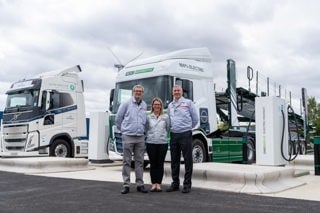By Jordan Brompton, co-founder and chief marketing officer at Myenergi
UK manufacturing – rich in history and accomplishment – now finds itself navigating the complex aftermath of Brexit, COVID-19, and a quickly evolving global supply chain.
The stakes may have never been higher, with withdrawal from the EU leading to increased scrutiny over trade relationships, more complexity for goods crossing borders and stressing the need for a more robust domestic manufacturing base.
Fortunately, the UK is well positioned to meet the challenges posed by shifts in international industry and trade.
With world-leading educational institutions and a long history of innovation, there is a lot to be optimistic about as the UK seeks to reassert itself as an independent and modern manufacturing nation.
While all of this is taking place, another shift places both burden and opportunity on the shoulders of automotive manufacturers and the wider automotive supply chain.
As the sector undergoes significant transformation, specifically the shift toward electrification and sustainable technologies, there is a compelling business case for increased investment and incentives for domestic capabilities.
A history of innovation and challenges overcome
The British automotive sector has long been a symbol of innovation and craftsmanship.
Since the early 20th century, it has homed renowned names like Jaguar, Land Rover and many more.
Surviving the turbulent waters of 20th century labour disputes and global competition, as well as the oil crisis of the 1970s, the industry persevered by focusing on specialised, high-quality vehicles and investing in modern manufacturing technologies.
Fast-forward to today and the trade uncertainties brought by Brexit posed a fresh set of challenges.
It’s hard to argue that the move has been without impact, but it has also brought new possibilities, many of which are yet to be fully realised.
Through each obstacle, the constant has been the ability to innovate through talented minds and a skilled workforce. Indeed, the ability of the automotive industry to rapidly pivot to a cause that serves the nation’s interest has repeatedly demonstrated its value.
Electric evolution of the industry
In the face of the climate crisis, the entire global transport industry is undergoing a seismic shift towards decarbonisation. This has had obvious effects on vehicle design, manufacturing and supply chains.
Here in the UK, the popularity of electric vehicles continues to rise, helping domestic OEMs to better align with global trends.
According to the Society of Motor Manufacturers and Traders (SMMT), electrified vehicles now account for more than a third (35.4%) of the UK's new car market, with battery electric vehicles (BEVs) reporting an 87.9% year-on-year increase.
This surge in adoption highlights the domestic embrace of greener mobility solutions, a trend echoed in Europe and other developed nations.
This represents an important opportunity and pivot point for the UK’s automotive industry. It is not just a legacy to be maintained, but a launchpad for future innovations.
Make no mistake, the UK is currently far from a leader by volume, coming in at 18th, but it does have a chance at reinvention.
While countries like China, the USA and Germany dominate, the skills and manufacturing capacity of the UK can be turned to developing and producing innovative solutions and products that further enable sustainable mobility.
Mobility innovation in the home
The increasing presence of electric and hybrid vehicles means a growing demand for charging infrastructure. This has created a space for technological innovation and manufacturing, where companies like myenergi have designed, engineered and developed pioneering solutions.
Our continued growth is just one example of how the automotive industry’s shift is creating new opportunities within the wider supply chain, where technology-focussed companies can benefit from the UK’s immense science, engineering, and manufacturing skill base.
Is the future made in Britain?
The automotive industry in the UK is at a turning point. While the sector’s resilience has long been tied to the vehicles that roll off the assembly lines, its future competitiveness lies in the technology that powers those vehicles.
From EV chargers to autonomous driving software, new technologies are the automotive sector’s frontier.
It is in this melding of science, engineering, manufacturing, and innovation that the UK can reassert its manufacturing industry and play a leading role in the automotive world of tomorrow.
The time is ripe to focus on modern automotive systems and advanced manufacturing, keeping the wider UK automotive industry and supply chain at the forefront of the global transport landscape.




















Login to comment
Comments
No comments have been made yet.